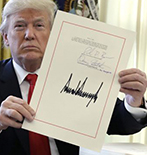Taxes directly affect Americans by compelling them to surrender part of their income to the government, and indirectly since the taxing power can positively or negatively affect economic growth.
In the U.S., our tax regimes are in serious need for reform, both at the state and federal level. Our tax code fails to sufficiently incentivize investment, the primary driver of economic growth. And it hobbles U.S. companies as they compete internationally.
IPI believes that the purpose of taxes is to raise the revenue necessary to fund the legitimate functions of government while imposing the least possible impact upon the functioning of the economy. We therefore believe that taxes should be simple, transparent, neutral, territorial and competitive.
Because of its tremendous potential to stimulate real long-term economic growth, tax reform should be a top priority of policymakers.
Conservative Groups and Activists Urge House Action on Making Individual Tax Cuts Permanent
Since it was signed into law, the Tax Cuts and Jobs Act has increased take-home pay, simplified the tax code, and grown the economy.
Former Adviser Praises Trump for Tax Cuts and Deregulation but Calls His Tariffs 'Stupid'
In his presentation, titled “Trumponomics: How and Why It’s Working,” Moore said that the heart of “Trumponomics” is growing the economy as rapidly as possible and that many of the major issues facing our country today — including poverty, the national debt, income inequality and education — will be easier to solve if the economy is growing faster.
Supreme Court Ruling on Sales Tax Weighs on Amazon.com, Inc.
It’s unclear how the new ruling will effect smaller sellers, but Institute for Policy Innovation president Tom Giovanetti is in the camp of those that sees it as a big problem for them.
Supremes' Decision Branded Online Taxation Without Representation
“In today’s Wayfair decision, the Supreme Court overturned 25 years of its own precedent and decided that states will be able to assess sales taxes on internet transactions, siding with the state of South Dakota against Wayfair and other online sellers," said IPI president Tom Giovanetti, who also sounded ready to throw some tea overboard.
Supreme Court's Online Sales Tax Ruling Gives States a Win
“The decision leaves e-commerce and especially small sellers extremely vulnerable to states gluttonous for tax revenue particularly from consumers and businesses with no representation in their state,” said Tom Giovanetti, president of the Institute for Policy Innovation.
Amazon Shares Fall After Supreme Court Ruling on Sales Tax, As Brick-and-Mortar Retailers Gain
“The decision leaves e-commerce and especially small sellers extremely vulnerable to states gluttonous for tax revenue particularly from consumers and businesses with no presence in their state,” IPI president Tom Giovanetti said in a statement.
SCOTUS Wayfair Decision Threatens e-Commerce, Economic Growth
In Thursday’s Wayfair decision, the Supreme Court overturned 25 years of its own precedent and decided that states will be able to assess sales taxes on internet transactions, siding with the state of South Dakota against Wayfair and other online sellers.
Give Wayfair (and Americans) A Fair Break on Taxes
If South Dakota wins, all of us may confront tax demands from states and localities we've never visited and have nothing to do with.
Supreme Court Hears Landmark Internet Sales Tax Case
Today the Supreme Court heard oral arguments in the landmark Internet sales tax case, South Dakota vs. Wayfair, which could allow states to force businesses in other states to collect internet sales taxes for them.







